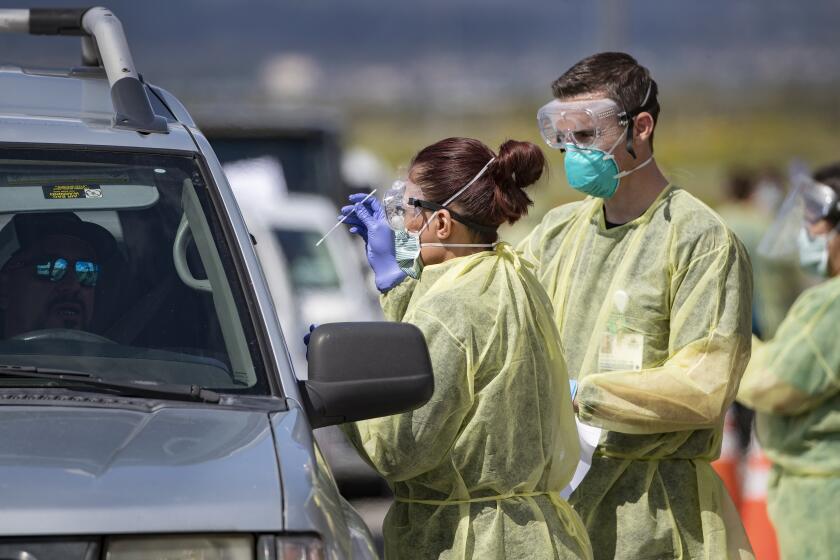Film academy considers Oscar eligibility rules change with coronavirus theater closings
- Share via
“Crip Camp,” a documentary about a “summer camp for the handicapped run by hippies” that inspired the disabled rights movement, opened the Sundance Film Festival in January with volunteers turning away ticket holders because every seat in the Eccles Theater was spoken for.
Outside, there was a massive scrum with rumors flying that Barack and Michelle Obama, executive producers on the film through their company Higher Ground, might be attending. That proved to be wishful thinking, but their absence didn’t dampen the response to the movie. “Crip Camp” left Sundance with the festival’s Documentary Audience Award, great reviews and the feeling that it could follow the path of “American Factory,” the Netflix/Higher Ground film that won the documentary Oscar this year.
The latest updates from our reporters in California and around the world
“Crip Camp” might still wind up at the Oscars. But if it does (provided the Oscars actually take place), it will be traveling a different path — as might every movie with awards aspirations in 2020, owing to the current COVID-19 pandemic.
The motion picture academy’s leadership has been actively discussing altering its rules in recent days, with an announcement likely in the next couple of weeks that could ease the requirements for movies to qualify for the 2021 Oscars.
“It’s all we talk about,” said a source close to the academy who was not authorized to comment on the record.
The academy issued a statement Thursday, noting that it is “in the process of evaluating all aspects of this uncertain landscape and what changes may need to be made,” adding that its leadership is “committed to being nimble and forward-thinking” in its evaluations.
“Translated,” says one of the academy’s 54 governors, “that means everything is on the table this year because we have no idea what the next several months are going to look like right now.”
“Crip Camp” was set to open theatrically Wednesday in Los Angeles, New York and San Francisco, concurrent with its streaming premiere on Netflix. The documentary will still land on Netflix, but whether it ever plays in theaters remains in question with the nationwide closure of cinemas because of COVID-19.
Currently, for a movie to qualify for the Oscars, motion picture academy rules state that it must play for at least seven days in a Los Angeles County commercial theater, with at least three screenings per day for paid admission. The academy’s board of governors went out of its way to reaffirm that rule at its April meeting last year, with then-President John Bailey calling the support of the theatrical experience “integral to the art of motion pictures.”
But with moviegoing off the table for the foreseeable future, and studios such as Universal Pictures and DreamWorks releasing current films and the upcoming animated “Trolls World Tour” for home viewing and Warner Bros. and others rushing their recent releases to VOD, it may be difficult for the “theatrical experience” to be integral to anything this year, including the Oscars.
As theaters have shuttered globally and movie releases have been postponed indefinitely, several major studios have opted out of reporting box office grosses in the wake of the COVID-19 pandemic.
Filming on many of the year’s most promising titles — Sofia Coppola’s family comedy-drama “On the Rocks,” Steven Spielberg’s adaptation of “West Side Story,” David Fincher’s Herman Mankiewicz biographical drama “Mank” — has been completed, and the movies are in various states of postproduction.
Wes Anderson’s latest, “The French Dispatch,” is locked and was presumably going to premiere at Cannes in May, though that film festival, like everything else these days, has been postponed. Thai filmmaker Apichatpong Weerasethakul’s latest, the Tilda Swinton-led drama “Memoria” (bought by Neon, the studio behind Oscar winner “Parasite”), likely was heading for Cannes too, as was Leos Carax’s musical “Annette,” starring Adam Driver and Marion Cotillard.
Spike Lee’s “Da 5 Bloods,” the story of four black veterans returning to Vietnam to deal with their trauma (and search for buried treasure), also is completed.
“Done. Finished. Locked And Loaded,” Lee wrote in an email to The Times.
The marketplace for these movies, though, will depend on how long the COVID-19 outbreak lasts and how the current pandemic might alter the landscape once the new normal of self-isolation and social distancing ends.
If and when theaters reopen, there could be a glut of previously postponed movies vying for release dates and screens. Awards-season contenders (again, presuming there is even an awards season to begin with) might need to shift to 2021.
Already, thanks to production shutdowns, two prime Emmy contenders set to premiere this spring — the latest installment of FX’s acclaimed limited series “Fargo,” starring Chris Rock, and National Geographic’s “Genius: Aretha” with Cynthia Erivo starring as Aretha Franklin — are thought to be out of contention, though their ultimate fate could depend on whether the Television Academy loosens its rule about how many episodes a series must air before its May 31 Emmy deadline.
“Everyone’s freaking out right now ... about everything,” says a veteran awards consultant. “A month ago, we were so done thinking about the Oscars. Now, I’d give everything just to be able to focus on something so trivial again.”
More to Read
Only good movies
Get the Indie Focus newsletter, Mark Olsen's weekly guide to the world of cinema.
You may occasionally receive promotional content from the Los Angeles Times.












